专四语法第15节-倒装和省略精编版
- 格式:docx
- 大小:42.13 KB
- 文档页数:7
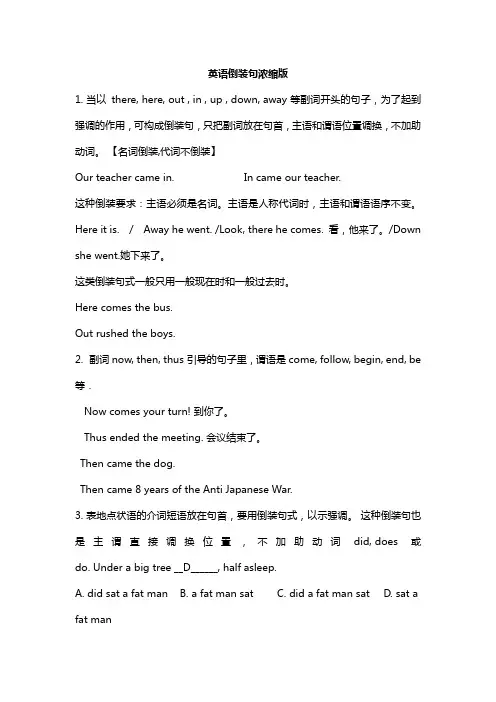
英语倒装句浓缩版1. 当以there, here, out , in , up , down, away 等副词开头的句子,为了起到强调的作用,可构成倒装句,只把副词放在句首,主语和谓语位置调换,不加助动词。
【名词倒装,代词不倒装】Our teacher came in. In came our teacher.这种倒装要求:主语必须是名词。
主语是人称代词时,主语和谓语语序不变。
Here it is. / Away he went. /Look, there he comes. 看,他来了。
/Down she went.她下来了。
这类倒装句式一般只用一般现在时和一般过去时。
Here comes the bus.Out rushed the boys.2. 副词now, then, thus 引导的句子里,谓语是come, follow, begin, end, be 等.Now comes your turn! 到你了。
Thus ended the meeting. 会议结束了。
Then came the dog.Then came 8 years of the Anti Japanese War.3. 表地点状语的介词短语放在句首,要用倒装句式,以示强调。
这种倒装句也是主谓直接调换位置,不加助动词did, does或do. Under a big tree __D______, half asleep.A. did sat a fat manB. a fat man satC. did a fat man satD. sat a fat man4. there放在句首时,要用倒装句式。
在“there + lives, stands, comes, lies, flows, enters, rises 和appears等。
There came shouts for help from the river.There lies a large wheat field in front of the house.Many years ago there lived an old man in the wooden house. In front of the tower flews a stream. 5. so + 动词+主语 ; neither/ nor + 动词+主语表示两人的同样一个情况时,只能表示一件事,即上、下句所使用的动词、时态要一致。

英语倒装句浓缩版1. 当以there, here, out , in , up , down, away 等副词开头的句子,为了起到强调的作用,可构成倒装句,只把副词放在句首,主语和谓语位置调换,不加助动词。
【名词倒装,代词不倒装】Our teacher came in. In came our teacher.这种倒装要求:主语必须是名词。
主语是人称代词时,主语和谓语语序不变。
Here it is. / Away he went. /Look, there he comes. 看,他来了。
/Down she went.她下来了。
这类倒装句式一般只用一般现在时和一般过去时。
Here comes the bus.Out rushed the boys.2. 副词now, then, thus 引导的句子里,谓语是come, follow, begin, end, be 等.Now comes your turn! 到你了。
Thus ended the meeting. 会议结束了。
Then came the dog.Then came 8 years of the Anti Japanese War.3. 表地点状语的介词短语放在句首,要用倒装句式,以示强调。
这种倒装句也是主谓直接调换位置,不加助动词did, does或do. Under a big tree __D______, half asleep.A. did sat a fat manB. a fat man satC. did a fat man satD. sat a fat man4. there放在句首时,要用倒装句式。
在“there + lives, stands, comes, lies, flows, enters, rises 和appears等。
There came shouts for help from the river.There lies a large wheat field in front of the house.Many years ago there lived an old man in the wooden house. In front of the tower flews a stream. 5. so + 动词+主语 ; neither/ nor + 动词+主语表示两人的同样一个情况时,只能表示一件事,即上、下句所使用的动词、时态要一致。
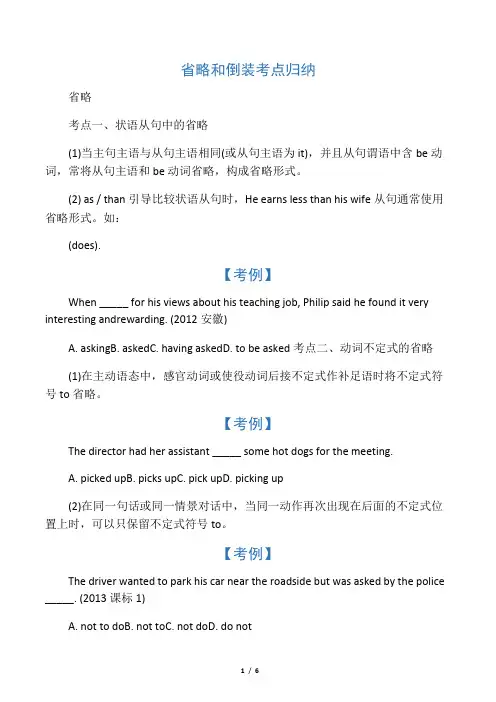
省略和倒装考点归纳省略考点一、状语从句中的省略(1)当主句主语与从句主语相同(或从句主语为it),并且从句谓语中含be动词,常将从句主语和be动词省略,构成省略形式。
(2) as / than引导比较状语从句时,He earns less than his wife从句通常使用省略形式。
如:(does).【考例】When _____ for his views about his teaching job, Philip said he found it very interesting andrewarding. (2012安徽)A. askingB. askedC. having askedD. to be asked考点二、动词不定式的省略(1)在主动语态中,感官动词或使役动词后接不定式作补足语时将不定式符号to省略。
【考例】The director had her assistant _____ some hot dogs for the meeting.A. picked upB. picks upC. pick upD. picking up(2)在同一句话或同一情景对话中,当同一动作再次出现在后面的不定式位置上时,可以只保留不定式符号to。
【考例】The driver wanted to park his car near the roadside but was asked by the police _____. (2013课标1)A. not to doB. not toC. not doD. do not考点三、使用替代词so / not英语中常用so/not等来代替省略的肯定内容或否定内容,多跟在I’mafraid/Ihope/Ithink / I guess / I believe / I expect / I suppose等开头的答语中,条件状语从句中也有类似的用法。
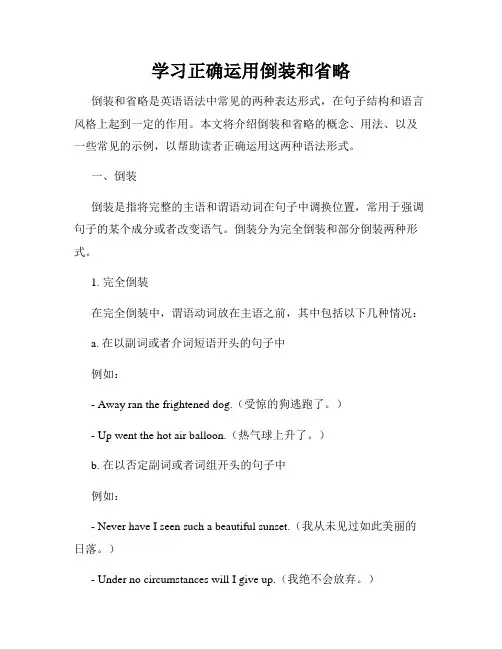
学习正确运用倒装和省略倒装和省略是英语语法中常见的两种表达形式,在句子结构和语言风格上起到一定的作用。
本文将介绍倒装和省略的概念、用法、以及一些常见的示例,以帮助读者正确运用这两种语法形式。
一、倒装倒装是指将完整的主语和谓语动词在句子中调换位置,常用于强调句子的某个成分或者改变语气。
倒装分为完全倒装和部分倒装两种形式。
1. 完全倒装在完全倒装中,谓语动词放在主语之前,其中包括以下几种情况:a. 在以副词或者介词短语开头的句子中例如:- Away ran the frightened dog.(受惊的狗逃跑了。
)- Up went the hot air balloon.(热气球上升了。
)b. 在以否定副词或者词组开头的句子中例如:- Never have I seen such a beautiful sunset.(我从未见过如此美丽的日落。
)- Under no circumstances will I give up.(我绝不会放弃。
)c. 在以地点状语或时间状语开头的句子中例如:- On the top of the mountain stood a small cottage.(山顶上坐落着一座小屋。
)- In the middle of the night, came a loud noise.(半夜里传来了一声巨响。
)2. 部分倒装部分倒装是指将助动词、情态动词或者是be动词与主语进行调换位置,常用于疑问句、条件句和其它表达特殊语气的句型中。
常见的部分倒装句型有以下几种:a. 疑问句例如:- Does he like playing basketball?(他喜欢打篮球吗?)- Can you swim?(你会游泳吗?)b. 条件句例如:- Should you need any help, please let me know.(如果你需要帮助,请告诉我。
)- Were I rich, I would travel around the world.(要是我富有,我会周游世界。
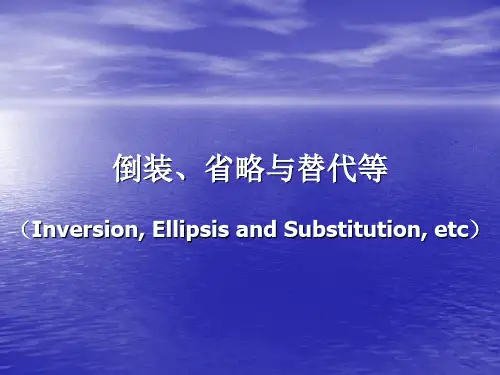
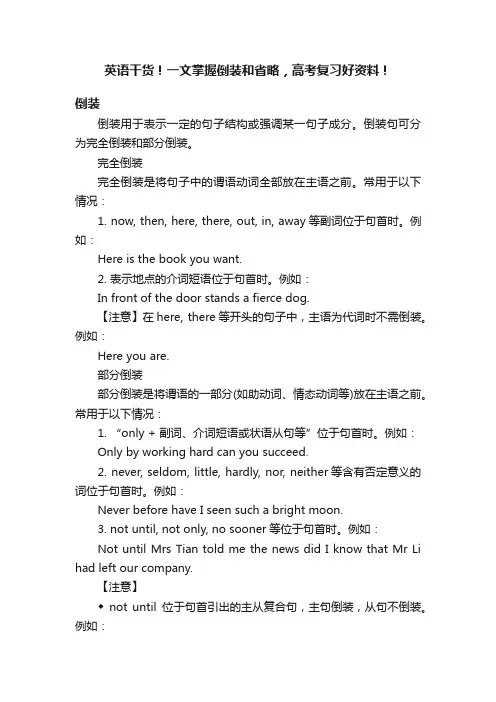
英语干货!一文掌握倒装和省略,高考复习好资料!倒装倒装用于表示一定的句子结构或强调某一句子成分。
倒装句可分为完全倒装和部分倒装。
完全倒装完全倒装是将句子中的谓语动词全部放在主语之前。
常用于以下情况:1. now, then, here, there, out, in, away等副词位于句首时。
例如:Here is the book you want.2. 表示地点的介词短语位于句首时。
例如:In front of the door stands a fierce dog.【注意】在here, there等开头的句子中,主语为代词时不需倒装。
例如:Here you are.部分倒装部分倒装是将谓语的一部分(如助动词、情态动词等)放在主语之前。
常用于以下情况:1. “only + 副词、介词短语或状语从句等”位于句首时。
例如:Only by working hard can you succeed.2. never, seldom, little, hardly, nor, neither等含有否定意义的词位于句首时。
例如:Never before have I seen such a bright moon.3. not until, not only, no sooner等位于句首时。
例如:Not until Mrs Tian told me the news did I know that Mr Li had left our company.【注意】◆ not until位于句首引出的主从复合句,主句倒装,从句不倒装。
例如:Not until his sister came back did Jones leave the hospital.◆hardly (… when …) 或no sooner (…than …)位于句首时,主句倒装,从句不倒装。
例如:Hardly had I closed the door when I realized that I had left the key at home.◆ not only … but also …连接两个分句,且not only位于句首时,not only后面的分句倒装,but also后面的分句不倒装。
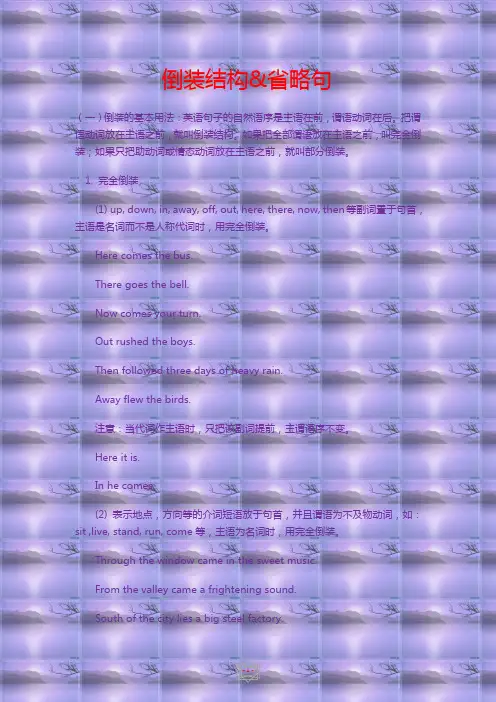
倒装结构&省略句(一)倒装的基本用法:英语句子的自然语序是主语在前,谓语动词在后。
把谓语动词放在主语之前,就叫倒装结构。
如果把全部谓语放在主语之前,叫完全倒装;如果只把助动词或情态动词放在主语之前,就叫部分倒装。
1. 完全倒装(1) up, down, in, away, off, out, here, there, now, then等副词置于句首,主语是名词而不是人称代词时,用完全倒装。
Here comes the bus.There goes the bell.Now comes your turn.Out rushed the boys.Then followed three days of heavy rain.Away flew the birds.注意:当代词作主语时,只把该副词提前,主谓语序不变。
Here it is.In he comes.(2) 表示地点,方向等的介词短语放于句首,并且谓语为不及物动词,如:sit ,live, stand, run, come等,主语为名词时,用完全倒装。
Through the window came in the sweet music.From the valley came a frightening sound.South of the city lies a big steel factory.(3) 表语置于句首时,使用倒装结构“表语+连系动词+主语”。
<1>形容词+连系动词+主语Present at the meeting were Professor White, Professor Smith and many other guests.<2> 过去分词+连系动词+主语Gone are the days when they could do what they liked to the Chinese people.<3>介词短语+be +主语Among the goods are Christmas trees, flowers, candles and toys.2. 部分倒装(1)用于so, nor ,neither开头的句子,表示“也(不)”,表示前面所说的情况也适用于另一个人或物时,要用部分倒装,其句型结构为:so/neither/ nor + be/助动词/情态动词+主语,so与前面的肯定句呼应,neither/nor与前面的否定句相呼应。
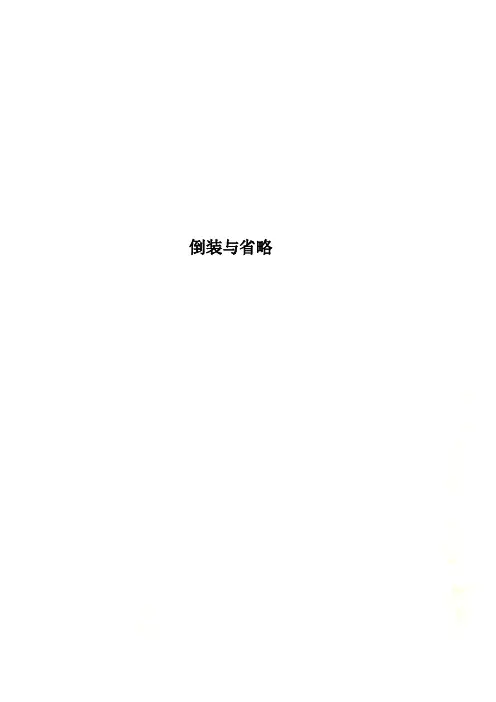
倒装与省略倒装与省略一、基础知识构建倒装谓语动词放在主语之前的这种语法现象称为倒装。
从倒装的形式来看,可分为全部倒装(full inversion)和部分倒装(partial inversion)两种。
前者是指整个谓语置于主语之前,而后者仅是指助动词、情态动词或be 动词等功能置于主语这前。
(一)完全倒装完全倒装是将句子中的谓语动词全部置于主语之前。
常见的情况有:1. 表示方向或方位的副词或介词短语置于句首, 如here, there, away,down, in, up, off, out, on the wall,round the corner等,用以强调或表达生动。
1) Here comes the bus. 公共汽车来了。
2) There goes the bell. 铃响了。
23) Out rushed the children. 孩子们冲了出来。
4) In came the boy. 那个男孩进来了。
5) West of the lake lies the famous city . 这个名城位于湖的西面。
6) On the hill stood a great castle. 山上矗立着一座巨大的城堡。
*上述全部倒装的句型结构的主语必须是名词,如果主语是人称代词则主语和谓语的语序不变。
7) Here it is. 给你。
8) Away he went. 他走了。
2.直接引语的一部分或全部放在句首时,有时也用倒装。
9)“What does the word mean?” asked the boy. “这个词是什么意思?”男孩问道。
3.such 置于句首。
10) Such are the facts; no one can deny341.no longer, no t until, hardly… when, no sooner…than, scarcely…when, in no time 等。
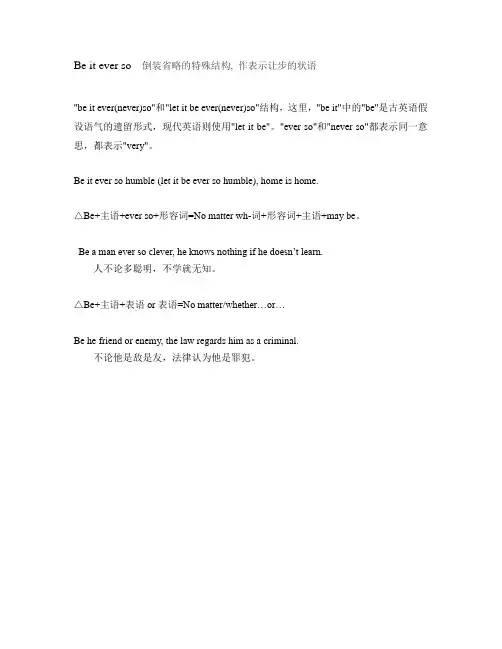
Be it ever so 倒装省略的特殊结构, 作表示让步的状语"be it ever(never)so"和"let it be ever(never)so"结构,这里,"be it"中的"be"是古英语假设语气的遗留形式,现代英语则使用"let it be"。
"ever so"和"never so"都表示同一意思,都表示"very"。
Be it ever so humble (let it be ever so humble), home is home.△Be+主语+ever so+形容词=No matter wh-词+形容词+主语+may be。
Be a man ever so clever, he knows nothing if he doesn’t learn.人不论多聪明,不学就无知。
△Be+主语+表语or表语=No matter/whether…or…Be he friend or enemy, the law regards him as a criminal.不论他是敌是友,法律认为他是罪犯。
倒装句精讲及练习"倒装句"主要指的是谓语语序的倒装,当然也有宾语和表语语序的倒装。
倒装句分为两种,部分倒装(将谓语的一部分提到主语之前)和全部倒装(将谓语的全部提到主语之前)。
一、部分倒装部分倒装是把be动词、情态动词、助动词放到主语之前。
如果句子中没有这些词,要在主语之前加助动词do / does / did等,而把原来的谓语动词变成原形放在主语之后。
部分倒装主要有以下几种情况:1. 句首状语为否定词或半否定词的句子。
这类词或短语主要有never, neither, nor, little, seldom, rarely, hardly, scarcely, no sooner, not only, in no way, at no time, few, not, no等, 如:Not a word did I say to him.Never have I found him so happy.Little does he care about what I said.I can't swim. Neither can he.No sooner had he gone to bed than he fell asleep.巩固练习:1) Hardly ________ the airport when the plane took off.A. I had arrived atB. had I arrivedC. had I reachedD. I had got to2) —Have you ever seen anything like that before?—No, ________ anything like that before.A. I never have seenB. never I have seenC. never have I seenD. I have seen3) She is not fond of cooking, ________ I.A. so amB. nor amC. neitherD. nor do2. only + 状语放在句首,要部分倒装。
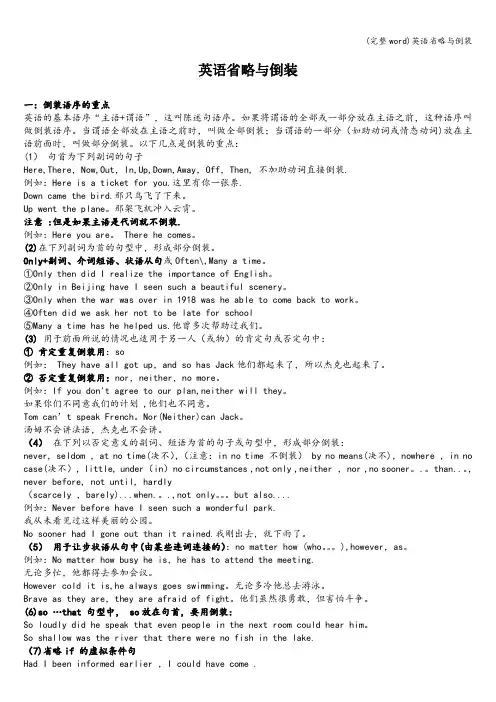
英语省略与倒装一:倒装语序的重点英语的基本语序“主语+谓语”,这叫陈述句语序。
如果将谓语的全部或一部分放在主语之前,这种语序叫做倒装语序。
当谓语全部放在主语之前时,叫做全部倒装;当谓语的一部分(如助动词或情态动词)放在主语前面时,叫做部分倒装。
以下几点是倒装的重点:(1)句首为下列副词的句子Here,There,Now,Out,In,Up,Down,Away,Off,Then, 不加助动词直接倒装.例如:Here is a ticket for you.这里有你一张票.Down came the bird.那只鸟飞了下来。
Up went the plane。
那架飞机冲入云霄。
注意 :但是如果主语是代词就不倒装.例如:Here you are。
There he comes。
(2)在下列副词为首的句型中,形成部分倒装。
Only+副词、介词短语、状语从句或Often\,Many a time。
①Only then did I realize the importance of English。
②Only in Beijing have I seen such a beautiful scenery。
③Only when the war was over in 1918 was he able to come back to work。
④Often did we ask her not to be late for school⑤Many a time has he helped us.他曾多次帮助过我们。
(3)用于前面所说的情况也适用于另一人(或物)的肯定句或否定句中:①肯定重复倒装用:so例如: They have all got up,and so has Jack他们都起来了,所以杰克也起来了。
②否定重复倒装用:nor,neither,no more。
例如:If you don't agree to our plan,neither will they。
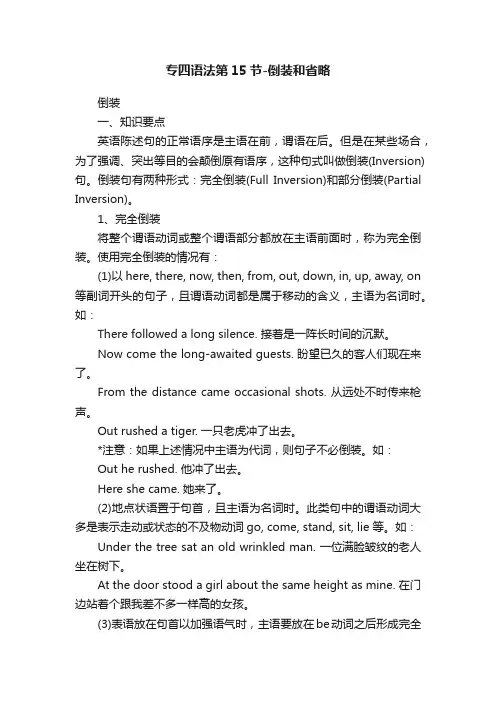
专四语法第15节-倒装和省略倒装一、知识要点英语陈述句的正常语序是主语在前,谓语在后。
但是在某些场合,为了强调、突出等目的会颠倒原有语序,这种句式叫做倒装(Inversion)句。
倒装句有两种形式:完全倒装(Full Inversion)和部分倒装(Partial Inversion)。
1、完全倒装将整个谓语动词或整个谓语部分都放在主语前面时,称为完全倒装。
使用完全倒装的情况有:(1)以here, there, now, then, from, out, down, in, up, away, on 等副词开头的句子,且谓语动词都是属于移动的含义,主语为名词时。
如:There followed a long silence. 接着是一阵长时间的沉默。
Now come the long-awaited guests. 盼望已久的客人们现在来了。
From the distance came occasional shots. 从远处不时传来枪声。
Out rushed a tiger. 一只老虎冲了出去。
*注意:如果上述情况中主语为代词,则句子不必倒装。
如:Out he rushed. 他冲了出去。
Here she came. 她来了。
(2)地点状语置于句首,且主语为名词时。
此类句中的谓语动词大多是表示走动或状态的不及物动词go, come, stand, sit, lie 等。
如:Under the tree sat an old wrinkled man. 一位满脸皱纹的老人坐在树下。
At the door stood a girl about the same height as mine. 在门边站着个跟我差不多一样高的女孩。
(3)表语放在句首以加强语气时,主语要放在be动词之后形成完全倒装。
如:Below is the blue ocean. 下面是蓝色的海洋。
(4) 有时为了强调,可将谓语部分的现在分词、过去分词或不定式置于句首,从而构成倒装。
专四语言知识之倒装与省略倒装一、知识要点英语陈述句的正常语序是主语在前,谓语在后。
但是在某些场合,为了强调、突出等目的会颠倒原有语序,这种句式叫做倒装(Inversion)句。
倒装句有两种形式:完全倒装(Full Inversion)和部分倒装(Partial Inversion)。
1、完全倒装将整个谓语动词或整个谓语部分都放在主语前面时,称为完全倒装。
使用完全倒装的情况有:(1)以here, there, now, then, from, out, down, in, up, away, on等副词开头的句子,且谓语动词都是属于移动的含义,主语为名词时。
如:There followed a long silence. 接着是一阵长时间的沉默。
Now come the long-awaited guests. 盼望已久的客人们现在来了。
From the distance came occasional shots. 从远处不时传来枪声。
Out rushed a tiger. 一只老虎冲了出去。
*注意:如果上述情况中主语为代词,则句子不必倒装。
如:Out he rushed. 他冲了出去。
Here she came. 她来了。
(2)地点状语置于句首,且主语为名词时。
此类句中的谓语动词大多是表示走动或状态的不及物动词go, come, stand, sit, lie 等。
如:Under the tree sat an old wrinkled man. 一位满脸皱纹的老人坐在树下。
At the door stood a girl about the same height as mine. 在门边站着个跟我差不多一样高的女孩。
(3)表语放在句首以加强语气时,主语要放在be动词之后形成完全倒装。
如:Below is the blue ocean. 下面是蓝色的海洋。
(4) 有时为了强调,可将谓语部分的现在分词、过去分词或不定式置于句首,从而构成倒装。
如:Standing at the door is a charming girl. 坐在门口的是一个可人的女孩。
To be carefully considered are the following questions. 下列问题要仔细考虑。
2、部分倒装只将助动词置于主语前,谓语其余部分置于主语后,则是部分倒装。
下列情况使用部分倒装:(1)否定词及含有否定意义的副词或词组置于句首时,句子要部分倒装:never, no, not, not only, hardly, scarcely, rarely, little, seldom, nowhere, no sooner…than, hardly/ barely/ scarcely…when, not until…, at no time, by no means, on no account, in no way, in no case, on no condition, in/under no circumstances 等。
如:In no way am I responsible for what has happened. 我决不会对已经发生的事负责。
No sooner had the bell rung than the students rushed out of the classroom. 铃声一响,学生们就跑出了教室。
(2)以only修饰状语开头的句子,要部分倒装。
如:Only last week did they get married. 他们上个星期刚结婚。
Only if I get a job will I have enough money to get the camera. 我只有找到了工作才有足够的钱买那款相机。
*注意:only属于主语的一部分时,不可用倒装结构。
如:Only a few people understood what he said. 只有很少人懂得他在说什么。
(3)以下列副词或短语开头的句子,句子要部分倒装so, such, to such a degree, to such an extent, to such extremes, to such a point等。
如:Such was the weather that I could not go out. 天气如此这般,我出不了门。
To such a degree did the story touch me that I took notes of it. 这个故事深深地打动了我,于是我把它记了下来。
(4)句首为so, nor, neither等副词,表明前句说明的情况也适用于该句时,句子通常要部分倒装。
如:He didn't say anything. Nor/ Neither did his assistant. 他什么都没说,他助手也没吭声。
People in Britain rest two days a week. So do Chinese. 英国人一周休息两天,中国人也一样。
*注意:当so放在句首只是对对方所陈述的内容表示肯定时,不用倒装。
如:“Tom wants to complete the important task.”“So he does.”“汤姆想完成那项重要的任务。
”“他的确想。
”(5)虚拟条件句可以省略连同if,把从句中的助动词(were, should/could/might或had)移至主语前,形成部分倒装。
如:Had you been (= If you had been ) here last night, you would have met her. 如果你昨晚来这里的话,你就会见到她。
Be any person (= If any person be) guilty of a crime, the court shall have the right to appeal. 任何人犯罪,法院都有权上诉。
Were I you (=If I were you),I would go to look for him. 如果我是你,就会去找他。
(6)as和though引导的让步状语从句通常用倒装结构,as必须用倒装结构,though可用也可不用倒装。
这种倒装通常是把从句中的表语、状语或谓语动词放在句首。
如:Small as it is, an atom can still be seen. 虽然小,原子还是能被看见。
Sick as/ though she was, she came to work. 尽管她病了,她还是来上班了。
省略为了避免重复、突出新信息并使上下文紧密连接,英语中常常会省略。
以下为常考的几种省略(Ellipsis) 形式。
1.并列句中,如果后面句子和前面句子有相同的成分,往往都会省略,以避免重复。
To some smile is very easy, and to others (smile is) so hard. 对有些人而言笑一下很容易,而对另一些人而言则很困难。
I guess Lisa will dance in the party but Jane won't (dance in the party). 我认为丽萨会在聚会上跳舞,而简不会。
2.复合句中从句的句尾和主句相重复时从句的句尾部分可省掉。
Mary is going to sweep the floor because Alice won't (sweep the floor). 因为爱丽丝不打扫地板,玛丽只好去打扫了。
He may leave if he wishes to (leave). 如果他想走的话,他可以走。
3.在以if, when, though, although, as, as if 等连词引导的从句中,如从句中主要动词是be,可将主语和动词be省掉。
He is very good at dancing, though (he is) very old. 虽然他年事已高,但他却跳得非常棒。
when (he was) asked about the advertising campaign of the new product, the manager said it was a great success. 问及新产品的广告宣传时,经理称很成功。
This is an illness that can result in total blindness left untreated.A. afterB. ifC. sinceD. unless译文:这种病如果得不到治疗,就会导致完全失明。
分析:如果从句的主语和主句的主语一致,且主动词为be,通常可省略从句的主语和系动词。
本题根据句意应选B。
此句完整形式为This is an illness that can result in total blindness if it is left untreated.4.用do, so, do so, not等替代旬中的一部分,构成省略。
(1) do 代替主动词。
如:Laura looks very happy. She always used to do (= look very happy), I remember. 劳拉看起来很开心,我记得她以前也总是(看起来开心)。
(2) do so 替代谓语结构,有时可以和do that, do it 交替使用。
如:He said he would tell me the news, but he didn’t do so/ that/it (= tell me the news).他说要告诉我那条消息,但是他没有。
(本句中的do so / that/ it 也可不要。
)(3) so+助动词+主语,该结构中的主语与前一句的主语指代不同的对象,表示"……也是如此”。
如:They want to see the famous basketball match and so do I. 他们想看这场有名的篮球赛,我也想去看。
I was tired, and so were they. 我很累,他们也是。
(4)so+主语+助动词,该结构中的主语指的就是前一句话中的主语,表示说话人认同对方的看法,意为"可不是嘛,的确如此"。
如:"They will win the championship.”“So they will. ”他们会获得冠军。